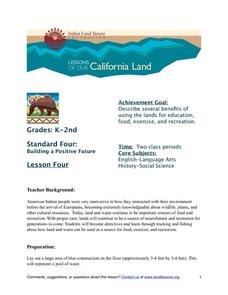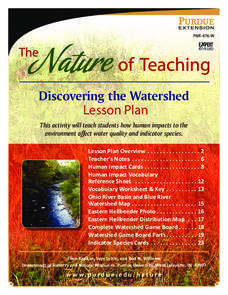British Council
A New Logo for the World Wildlife Fund
Where does the money go? Learners take a look at the logo for the World Wildlife Fund and discuss characteristics of the panda in the logo. Scholars learn that cute, fuzzy endangered animals often receive the most donations. They keep...
Aquarium of the Pacific
Kelp Forest Conservation
There otter be a better way. As a class, groups work together to create a food web based on the organisms in the kelp forest. Budding scientists watch a video on the kelp forest to see how the organisms create a food web and hear about...
Indian Land Tenure Foundation
Gifts from Land and Water
With a series of fun hands-on simulations, young children can learn about conservation and natural resources. Your learners become land detectives, discussing and investigating the gifts that the land and water provide them. They then...
Purdue University
Take-a-Hike
Learn about nature and health all in one set of lessons. Individuals use a scavenger hunt to record observations during a nature hike. They then complete activities to categorize their observations and rate the health of the habitat for...
Purdue University
Trees of the Midwest
All trees are not created equal. A set of three wildlife conservation lessons has learners examine the characteristics of individual trees. They look at the life cycle of the tree using a story and reference a field guide to identify...
Purdue University
Eco-llapse
A balanced ecosystem doesn't mean balanced populations. Budding scientists complete a series of activities to learn about the relationship between producers and consumers in an ecosystem. They complete the wildlife conservation...
National Wildlife Federation
Prairie Chicken Pageant
Diminishing habitats is a real concern that is threatening endangered species. Learners examine these concerns by studying the prairie chicken. Groups get a card with characteristics and threats to the species that they turn into skits.
Kenan Fellows
Sustainability: Learning for a Lifetime – Soil
Do great gardeners really have green thumbs—or just really great soil? Environmental scholars discover what makes Earth's soil and soil quality so important through research and experimentation. Learners also develop an understanding of...
Curated OER
Designing a Hiking Trail
Put your students' map skills to the test with this engaging cross-curricular project. Given the task of developing new hiking trails for their local community, young cartographers must map out beginner and intermediate paths that meet a...
Science 4 Inquiry
The Ups and Downs of Populations
As the reality of population decline across many species becomes real, pupils learn about the variables related to changes in populations. They complete a simulation of population changes and graph the results, then discuss limiting...
Sea World
Endangered Species
Study different endangered species with several activities that incorporate math, science, language arts, and research strategies. A great addition to your lesson on conservation or Earth Day.
Purdue University
Discovering the Watershed
Human impact on watersheds can make or break an ecosystem. Learners use a game to learn about the impact human choices have on water quality and the organisms that depend on it. The activity includes a game board and game cards that tell...
United Nations
Compost Monitor Training
What should go in the trash, and what can be composted? Guide your young conservationists through the process of composing their trash with a lesson about the different ways we can dispose of garbage. Using a trash bag with clean...
Illinois Department of Natural Resources
Section Two: Why is Biodiversity Important?
Explore soil, genetic traits, natural resources, and pollution in a series of lessons that focus on biodiversity. Kids complete experiments to learn more about the importance of varied genes and organisms in an ecosystem.
University of California
Impact of the California Missions on Native Americans
While the Spanish claimed to bring civilization to California indigenous peoples, in reality, they also brought violence and forced assimilation to European values. Primary sources, such as the reports of Catholic priests and Europeans...
Curated OER
Turning the Tide on Trash: Marine Debris Curriculum
Seven pages of fascinating reading on marine debris preface the activities in this lesson plan. Four different activities are employed to simulate how the debris is distributed in the ocean and along beaches. Early ecology learners...
Conserve Wildlife Foundation of New Jersey
The Great Peregrine Scavenger Hunt - On the Internet
The story of one bird provides valuable insight into general animal behaviors and interactions. Young researchers investigate the peregrine falcon using a web search. They analyze the behaviors of the raptor including its migration...
Curated OER
Turning the Tide on Trash: Marine Debris Curriculum
Six different lessons comprise this unit on marine debris. Science, language arts, social studies, and art projects make this an ideal interdisciplinary unit. The result will be well-informed future citizens who can help make a...
Howard Hughes Medical Institute
The Great Elephant Census Modeling Activity
They say elephants never forget—and your class won't forget an insightful modeling activity either! Junior zoologists take part in a mock elephant census using the sample count and total count methods. The included materials provide...




















